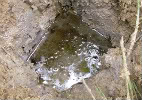Just weeks after a Chinese coal barge rammed the Great Barrier Reef, cutting a nearly two-mile swath through the reef and spilling three tons of engine fuel, fragile marine ecosystems are again threatened. Last Tuesday a BP oil rig platform exploded in the Gulf of Mexico, likely killing eleven workers. The blast also left oil leaking from the drill hole estimated at 42,000 gallons (or 1,000 barrels) of oil per day.
While officials are scrambling to stop the leak, fears have risen that the leaking oil could reach the coastlines of Louisiana, Mississippi, Alabama, and Florida within a few days, threatening coastal marshes, beaches, and islands.
“I don’t think anybody knows with confidence what the effects will be. We’ve never seen anything like this magnitude,” George Crozier, executive director at the Dauphin Island Sea Lab in Alabama, told the Washington Post .
Officials at first stated that oil was not leaking from the drill hole, however that statement changed after a few days. Yesterday a Remotely Operated Vehicle (ROV) was sent to plug the leak, but failed. Several others are en-route.
Important fishing grounds, the Gulf of Mexico is also home to sea birds, dolphins, coral reefs, and even alligators.
If emergency efforts to stop the leak over the next few days fail, officials estimate it could take over a month to stop the oil spill.
Last month, US President Barack Obama announced a new plan to open up offshore drilling along the northern coast of Alaska, the Atlantic coast, and the Gulf of Mexico, essentially opening up millions of acres that had long been off the table to oil interests. While applauded by some Republicans and the oil industry, the plan was vigorously opposed by most environmental organizations and some coastal governors and senators.
Related articles
Half a trillion spent on fossil fuel subsidies mostly “a complete waste of money”
(04/22/2010) Despite a warming planet linked to the burning of fossil fuels, governments around the world still spend 500 billion US dollars a year subsidizing fossil fuel industries. A new study from the Global Subsidies Initiative (GSI) of the International Institute for Sustainable Development looks at the difficult political situation behind ending fossil fuel subsidies.
Heavy oil pollution remains in Amazon, despite company claiming clean-up is finished

(09/17/2009) A new report shows that the Corrientes region of the Peruvian Amazon, which suffered decades of toxic contamination by Occidental Petroleum (OXY), is far from being cleaned-up. The survey, conducted by US non-profit E-Tech International, found that heavy metals, volatile organic compounds, and hydrocarbons still exist at levels above the safety limits set by Peru and continue to threaten the Achuar indigenous community, who have long fought against the oil companies.
Oil spill off Australia potential ‘disaster’ for marine wildlife
(08/30/2009) Oil is leaking from an offshore drilling rig in the Timor Sea near Australia’s Northwest coast. Authorities say it will be weeks before the leak is plugged: they are awaiting the arrival of a drilling rig from Singapore to plug the leak.